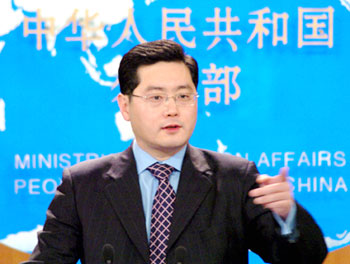
China is firmly opposed to comments made by the United States about the Diaoyu Islands, Foreign Ministry spokesman Qin Gang said Sunday.
Qin was answering media questions relating to comments US Secretary of State Hillary Clinton made on Friday.
Qin said, “We urge the US side to adopt a responsible attitude in regard to the issue of the Diaoyu Islands. It should be careful with its words, and act and maintain regional peace, stability and the general situation of China-US relations with practical actions and build credit with the Chinese people.”
At a joint news conference with Japanese Foreign Minister Fumio Kishida in Washington, Clinton said the United States does not take a position on the ultimate sovereignty of the Diaoyu Islands.
However, she admitted that the Diaoyu Islands was under the administrative authority of Japan, saying the United States opposes any unilateral actions to undermine Japanese authority over the islands.
“The comments by the US side are ignorant of facts and indiscriminate of rights and wrongs,” Qin said.
The United States cannot deny its historical responsibility on the issue of the Diaoyu Islands, Qin said, referring to the fact that despite opposition from China, the United States put the islands under the control of Japan after the World War II.
Qin said the Diaoyu Island and its affiliated islets have been the inherent territories of China, which is an undeniable fact backed up by historical records and international laws.
Qin said the primary source of persistent tension over the Diaoyu Islands lies with the Japanese government. He said Japan insisted on carrying out the wrongful action of purchasing some of the islands and continued to adopt escalating moves.
“This is yet another fact that cannot be covered up by any people,” Qin said.
Xinhua, 2013, 01, 21
_______________________________________________
Clinton sends warning to China over Senkakus
Atsushi Matsuura / Yomiuri Shimbun Correspondent
WASHINGTON–U.S. Secretary of State Hillary Clinton reassured Japan that the Senkaku Islands in Okinawa Prefecture are under the administration of Japan, adding that Washington opposes “any unilateral actions that would seek to undermine Japanese administration.”
Clinton’s remarks, made in connection with her talks with Foreign Minister Fumio Kishida at the State Department in Washington on Friday, are believed to be a warning to China over the nation’s provocations near the islands.
Clinton and Kishida agreed that the first Japan-U.S. summit meeting between Prime Minister Shinzo Abe and President Barack Obama will take place sometime in the week of Feb. 17.
Clinton also referred to the issue of the Senkaku Islands at a press conference after the meeting, saying, “We acknowledge they are under the administration of Japan and we oppose any unilateral actions that would seek to undermine Japanese administration.”
Clinton also reiterated the U.S. government’s position that the Japan-U.S. Security Treaty obliges the United States to defend Japan in case of island-related hostilities.
“With regard to regional security, I reiterated longstanding American policy on the Senkaku Islands and our treaty obligations,” Clinton said.
Acknowledging Clinton’s remarks, Kishida said, “While Japan will not concede and will uphold our fundamental position that the Senkaku Islands are an inherent territory of Japan, we intend to respond calmly so as not to provoke China.”
Kishida and Clinton also agreed to reinforce the Japan-U.S. alliance.
Kishida explained the government’s plan to boost the defense budget and review Japan’s outline of defense policy.
Regarding the relocation of the U.S. Marine Corps’ Futenma Air Station in Ginowan in the prefecture, Clinton expressed hopes of resolving the issue, saying, “We are confident that we can make progress on force realignment in Okinawa, including moving ahead with construction of the Futenma replacement facility.”
Regarding Japan’s participation in negotiations over the Trans-Pacific Partnership free trade framework, the two confirmed both governments will remain in close contact on the matter.
Clinton also said she would welcome Japan’s participation in the TPP talks.
Prior to the talks with Clinton, Kishida met U.S. Trade Representative Ron Kirk.
In the meeting with Kirk, Kishida explained the Liberal Democratic Party’s campaign pledge from the House of Representatives election, saying the party opposes participation in TPP negotiations as long as the pact is premised on the elimination of all tariffs without exception.
Regarding nuclear power, Kishida said the government will review the Democratic Party of Japan’s policy to have zero nuclear reactors operating in the 2030s.
(Jan. 20, 2013)
